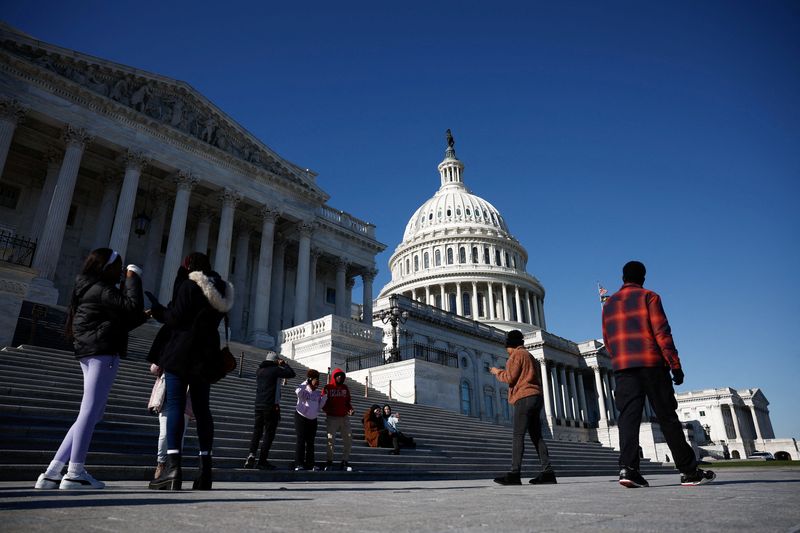A look at the day ahead in U.S. and global markets from Mike Dolan
U.S. government shutdown fears and fresh trade war threats cast another cloud over Wall Street as a bruising final full trading week of the year comes to a close and dampens what had been a stellar year for U.S. stocks.
Already sideswiped by what was seen as a ‘hawkish cut’ in Federal Reserve interest rates on Wednesday, where the central bank lifted both its 2025 policy rate and inflation projections, the was in the red again late Thursday and futures were down almost 1% before Friday’s bell.
A spending bill backed by Donald Trump failed in the U.S. House of Representatives late Thursday as dozens of Republicans defied the President-elect, leaving Congress with no clear plan to avert a fast-approaching government shutdown that could disrupt Christmas travel.
Government funding is due to expire at midnight on Friday. If lawmakers fail to extend that deadline, the U.S. government will begin a partial shutdown that would interrupt funding for everything from border enforcement to national parks and cut off paychecks for more than 2 million federal workers.
“Congress must get rid of, or extend out to, perhaps, 2029, the ridiculous Debt Ceiling. Without this, we should never make a deal,” Trump said on social media.
The combination of Fed hawkishness and government funding concerns sent long-term Treasury yields to their highest since May, with the 10-year benchmark coming close to 4.60% – a climb of almost 50 basis points in just two weeks.
Tracking the climb in yields, the hit its highest in two years on Thursday.
With November inflation readings from the Fed’s favored personal consumption expenditures gauge due out on Friday, Treasury yields and the dollar stepped back a notch.
But the cost of buying insurance against a potential U.S. sovereign default crept higher on Friday due to the shutdown fears. Credit default swaps on six-month U.S. bills nudged up to a four-week high of 11 bps, according to S&P Global.
Japan’s yen strengthened somewhat as data showing accelerating core Japanese inflation kept speculation of a new year interest rate hike from the Bank of Japan alive.
Top Japanese finance officials also said on Friday the government is “alarmed” by recent foreign exchange moves and is ready to intervene if speculative moves were deemed excessive, as the yen resumed its rapid downturn.
The warnings came as many emerging economy central banks from Brazil to South Korea intervened in recent days to halt the dollar’s steep rise.
A retreat of oil prices back below $70 per barrel also provided some solace for inflation worriers.
But Trump’s other broadsides on Thursday hit overseas stock markets as investors close out the year parsing what his new administration will do when it takes office next month.
European shares were on course to post their worst week in three months on Friday after the President-elect warned of trade tariffs on the European Union.
Trump said that the EU must purchase U.S. oil and gas to make up for its “tremendous deficit” with the world’s largest economy. “Otherwise, it is TARIFFS all the way!!!,” he added.
The pan-European index fell 1.1% to its lowest in nearly a month and was on course for its biggest weekly decline since early September.
And trade war and interest rate concerns saw stocks fall across Asia too.
Sterling was another big loser on Friday, falling to its lowest since May against the dollar. Even though the Bank of England held its interest rates steady as expected on Thursday, the 6-3 split among its policymakers showed two more council members in favor of a cut than had been assumed.
Adding to the pressure, Friday data showed British retail sales rose by a weaker-than-expected 0.2% in November.
Back on Wall Street there was better corporate news to digest, with shares in FedEx (NYSE:) jumping 8% in out of hours trading after the delivery firm announced the much-anticipated spinoff of its freight trucking division as it restructures its operations.
Key developments that should provide more direction to U.S. markets later on Friday:

* US November personal consumption expenditure (PCE) inflation gauge, December University of Michigan household sentiment survey
* U.S. corporate earnings: Carnival (NYSE:)

